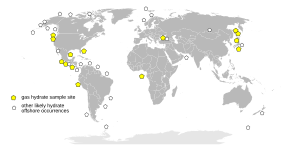
- Image via Wikipedia
Scientists say they have evidence that the powerful greenhouse gas methane is escaping from the Arctic sea-bed.
Researchers say this could be evidence of a predicted positive feedback effect of climate change.
As temperatures rise, the sea-bed grows warmer and frozen water crystals in the sediment break down, allowing methane trapped inside them to escape.
The research team found that more than 250 plumes of methane bubbles are rising from the sea-bed off Norway.
The joint British and German research team detected the bubbles using a type of sonar normally used to search for shoals of fish. Once detected, the bubbles were sampled and tested for methane at a range of depths.
Writing in Geophysical Research Letters, the team says the methane was rising from an area of sea-bed off West Spitsbergen, from depths between 150m and 400m.
The gas is normally trapped as “methane hydrate” in sediment under the ocean floor.
“Methane hydrate” is an ice-like substance composed of water and methane which is stable under conditions of high pressure and low temperature.
As temperatures rise, the hydrate breaks down. So this new evidence shows that methane is stable at water depths greater than 400m off Spitsbergen.
However, data collected over 30 years shows it was then stable at water depths as shallow as 360m.
Ocean has warmed
Temperature records show that this area of the ocean has warmed by 1C during the same period.
The research was carried out as part of the International Polar Year Initiative, funded by Britain’s Natural Environment Research Council (Nerc).
The team says this is the first time that this loss of stability associated with temperature rise has been observed during the current geological period.
Professor Tim Minshull of the National Oceanography Centre at Southampton told BBC News: “We already knew there was some methane hydrate in the ocean off Spitsbergen and that’s an area where climate change is happening rather faster than just about anywhere else in the world.”
Related articles by Zemanta
- Special Report: Energy: The Race to Harness Hydrates (nytimes.com)
- UK funds sea acidification study (news.bbc.co.uk)
- One of Antarctica’s largest glaciers ‘thinning four times faster than ten years ago’ (telegraph.co.uk)
- The Top Ten Greenhouse Gases (forcedgreen.com)
![Reblog this post [with Zemanta]](http://img.zemanta.com/reblog_b.png?x-id=3bba8b7e-2864-4829-a036-ba34e21d1978)








